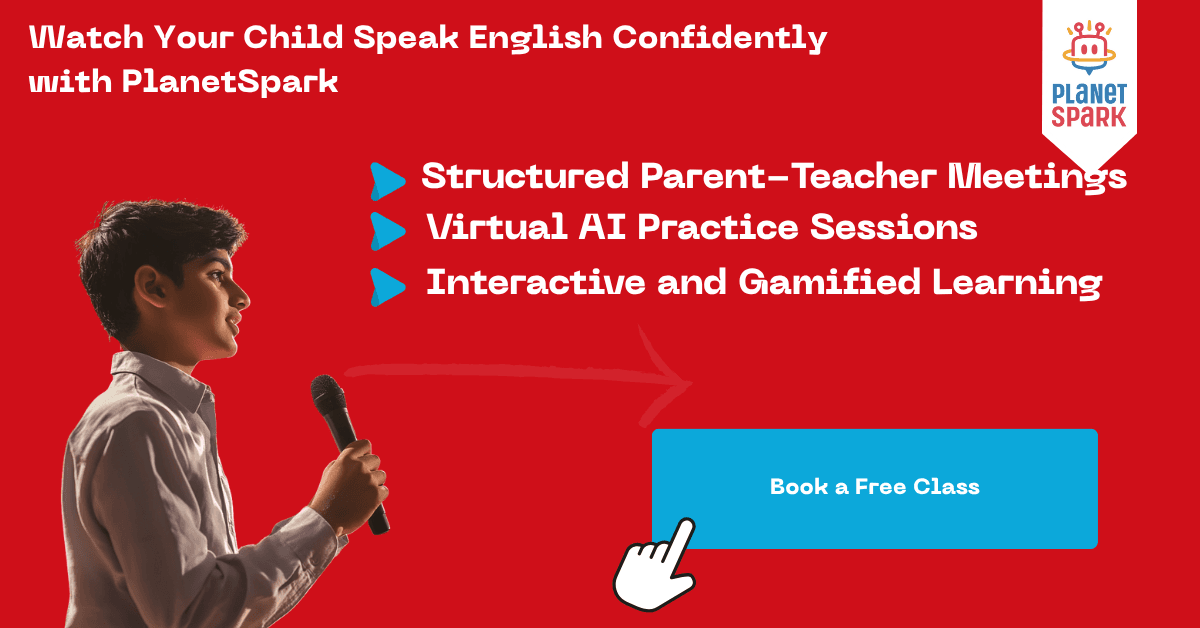Tips, Importance & Need for English Speaking Skills

Table of Contents
- What Are Speaking Skills in English?
- English Speaking Skills Important for Students, Why?
- Common Challenges Faced by Learners
- Improve Speaking Skills in English - 10 Steps
- Importance of 1:1 Attention in Speaking Skill Development
- How PlanetSpark Helps Build Speaking Skills in English
- Conclusion: Speaking Skills in English Are a Superpower
- FAQs
English speaking skills, in today’s world, are essential for academic, personal, and future career success. This blog explores what these skills are, why they matter, and how your child can master them with the right strategies. Discover how PlanetSpark’s programs—offering 1:1 training, AI tools, and a personalised roadmap—can transform your child into a confident communicator.
What Are Speaking Skills in English?
Speaking skills in English refer to a child’s ability to verbally communicate thoughts, ideas, and feelings with clarity, fluency, and accuracy. They involve not just vocabulary and grammar, but also confidence, pronunciation, body language, and expression. Some of the key components include:
- Fluency – Speaking smoothly without frequent pauses.
- Pronunciation – Clear and accurate enunciation of words.
- Vocabulary – Using a rich and relevant word bank.
- Grammar – Constructing grammatically correct sentences.
- Confidence – Speaking without fear or hesitation.
- Expression – Conveying thoughts with tone, body language, and emotion.
These skills come together to create impactful and effective verbal communication. Register here to sit for a free trial class
English Speaking Skills Important for Students, Why?
English speaking skills are essential not just for language proficiency, but for overall personality development. Here’s why every student should work on these skills:
1. Academic Success
In school, students often present projects, participate in debates, and engage in group discussions. English speaking skills help them articulate their thoughts clearly and stand out in a competitive classroom environment.
2. Confidence Building
Public speaking in English builds self-esteem. Whether it's answering questions, delivering a speech, or asking for help, confident communication empowers children.
3. Competitive Exams and Interviews
From school entrance interviews to scholarship applications and global contests, spoken English is often a key evaluation criterion.
4. Career Preparation
Professionals with strong speaking skills are more likely to excel in team communication, leadership, customer service, and job interviews.
5. Global Citizenship
English opens doors to international collaboration, travel, networking, and exposure to diverse cultures.

Common Challenges Faced by Learners
Even the brightest students may struggle with English speaking skills due to:
- Fear of mistakes
- Mother tongue influence (MTI)
- Lack of vocabulary or confidence
- Limited speaking opportunities at home/school
- Lack of feedback and correction
It’s essential to address these challenges with structured learning and safe spaces for practice. See how your child can improve with a free trial class
Improve Speaking Skills in English - 10 Steps
- Speak daily – Practice for 10–15 minutes every day.
- Watch English shows – Use subtitles to understand tone, pacing, and sentence structure.
- Record and review – Listening to your voice helps identify areas for improvement.
- Expand vocabulary – Learn and use five new words daily.
- Join English clubs – Practice speaking with peers in a low-pressure setting.
- Read aloud – Reading builds fluency, pronunciation, and confidence.
- Try JAM sessions (Just a Minute) – Speak on random topics for one minute.
- Imitate native speakers – Use the shadowing technique to improve natural speech.
- Use AI or learning apps – Engage in speaking simulations and receive instant feedback.
- Enroll in structured programs – Guided coaching makes a significant difference.
Games That Build Speaking Skills in Children
- Storytelling and role-plays
- Show and tell
- Debates and elocution contests
- Picture descriptions
- Public speaking games
These activities enhance fluency while making learning enjoyable.
Importance of 1:1 Attention in Speaking Skill Development
One-size-fits-all classrooms often fail to address individual learning styles. Personalized coaching helps students:
- Receive immediate feedback
- Build comfort and trust
- Address specific weaknesses
- Practice at their own pace
Let’s look at how PlanetSpark empowers children with structured personal mentorship.

How PlanetSpark Helps Build Speaking Skills in English
PlanetSpark is an all-in-one platform built to help students become confident communicators. Our structured English speaking programs include:
1:1 Personal Trainers for Every Child
Every student is matched with a certified communication expert who:
- Understands their unique learning style
- Offers real-time feedback and corrections
- Builds fluency, storytelling, public speaking, grammar, and creative writing skills
This ensures faster improvement and a strong mentor-child connection.
Personalised Curriculum and Learning Roadmap
We conduct an initial assessment and create a dynamic roadmap that:
- Identifies skill gaps in fluency, grammar, confidence, etc.
- Progresses from basic sentences to advanced speaking
- Adjusts as the student grows
SparkX – AI-Enabled Video Analysis Tool
Our AI tool evaluates:
- Voice clarity and body language
- Grammar and sentence structure
- Stage presence and organization of thoughts
Parents receive a detailed, actionable performance report.
AI-Led Practice Sessions
Students practise with a virtual AI coach that:
- Simulates real-life speaking tasks
- Provides instant correction
- Keeps engagement high outside of class
Spark Diary
A personal journal where kids:
- Write reflections, poems, and speeches
- Practice writing and self-expression
- Strengthen content structuring and creativity
6. Gamified Learning
Kids engage in interactive learning through:
- Vocabulary and spelling quizzes
- Grammar challenges
- Daily revision games
7. Structured Parent-Teacher Meetings (PTMs)
We schedule regular PTMs to:
- Share progress updates
- Discuss improvement plans
- Build a collaborative learning environment
8. Comprehensive Progress Reports
Our reports measure:
- Critical thinking, grammar, and expression
- Confidence, delivery, and organization
- Provide detailed trainer notes and next steps
9. Exclusive Learning Clubs
Kids collaborate and grow through:
- Debate, storytelling, and writing clubs
- Poetry circles and podcast groups
- Real-time peer interactions
10. Sparkline – Safe Content Sharing
A private content-sharing platform where kids:
- Post speeches, stories, and performances
- Receive positive peer feedback
11. Contests & Showcases
We offer regular events like:
- Storytelling and speech competitions
- Poetry and comedy showcases
- Open mic and podcast sessions
12. SparkBee and SparkShop
- SparkBee: Fun quizzes to master grammar, spelling, and vocabulary.
- SparkShop: Access engaging eBooks on communication skills and writing.
Through this holistic approach, PlanetSpark nurtures complete communicators, not just good speakers. Take part in a free trial class to understand more about PlanetSpark's spoken English classes here!
Conclusion: Speaking Skills in English Are a Superpower
In the digital-first, opportunity-rich world we live in, confident English communication can take your child places. Speaking skills in English are not just about language—they shape confidence, creativity, and future success. The earlier you start, the stronger the foundation. With PlanetSpark’s blend of 1:1 coaching, AI tools, fun activities, and consistent feedback, children gain real, measurable progress in speaking. Don’t wait. Give your child the power to speak their mind and own every stage.
